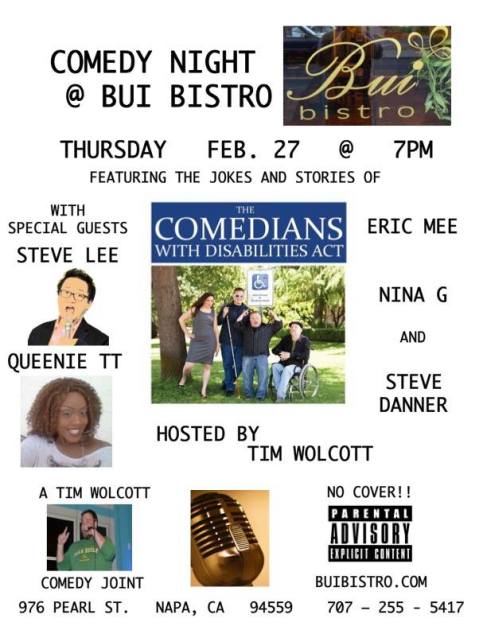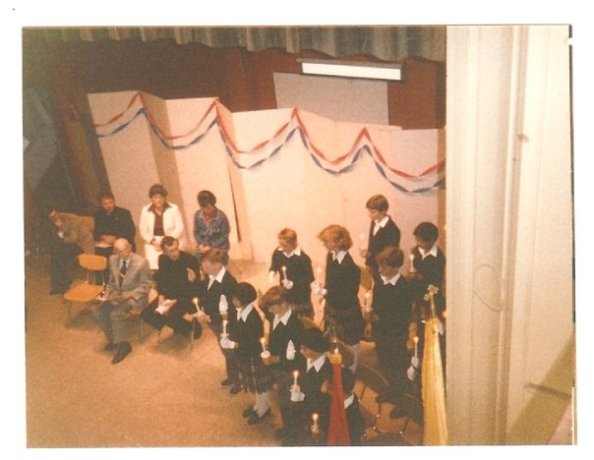FOR IMMEDIATE RELEASE
Contact: Tim Wolcott
Tel. 707-337-8582
Email: timwolcott79@gmail.com
THE “COMEDIANS WITH DISABILITIES ACT” TOUR ROLLS INTO NAPA Thursday Feb. 27 at Bui Bistro’s Comedy Night @ Bui Bistro.
A blind man. A stuttering woman. A wheelchair user. A little person. While this may sound like a description of a support group, it is, in fact, the lineup for the “Comedians with Disabilities Act”, a comedy tour that the San Francisco Examiner called “The most unconventional comics to pop up in 2011”. Made up entirely of performers with different disabilities, the troupe is bringing their “special” brand of humor to Comedy Night @ Bui Bistro, hosted by local comedian Tim Wolcott, on Thursday, Feb. 27 at 7pm.
The foursome, all of them working northern California comedians, met each other through the comedy club circuit and decided to band together to treat audiences to a unique and unforgettable experience.
“Lots of able-bodied comedians out there tell blind or wheelchair jokes and get the audience to laugh AT people with disabilities,” said Michael O’Connell, the group’s wheelchair representative and founder of the troupe. “But wouldn’t it be more fun for the crowd, we thought, to be invited to laugh WITH people with disabilities instead? That’s guilt-free fun right there.”
Since their first sold-out show in Sacramento, the group has been in growing demand, getting booked at such lauded venues as the Laugh Factory in Hollywood and San Francisco’s Punch Line comedy club. Their comedy comes from the lifetime of experiences each has had due to their individual challenges. They see the tour as not only a chance to entertain, but to educate people on disability issues.
“We’re all comedians first,” said Napa native Steve Danner who identifies as a Little Person, “and it’s a comedy show. But who says you can’t make people laugh and send them home with something to think about too?”
Danner’s comedy career began as an audience member at a club. The comedian on stage that night decided to have some fun at his expense, and Danner’s skills in heckling back at him led the comic to approach Danner after the show and suggest he give comedy a try. He did so, and soon began a career as a prolific comedian and producer, delighting crowds at clubs and comedy rooms all over the west coast with hysterical tales centered heavily on his dwarfism. His comic journey keeps him on the road much of the time, but as Danner is fond of saying, “Shrimpin’ ain’t easy!”.
Michael O’Connell was diagnosed with Muscular Dystrophy at two years old and began using a wheelchair in 1995. But it wasn’t until years later that a friend dared him to try doing comedy at an open mic night at a Sacramento club, and after ending up winning the competition that first night on stage, he never looked back. He’s played comedy clubs from Seattle to L.A. (including the Hollywood Improv and the Jon Lovitz Comedy Club), been featured in newspapers and on radio and television, and counts several Hollywood celebrities among his fans. His business card reads “100% Comedy, 0% Stand-Up”. Michael is unable to attend this show but you can check out his comedy at http://www.michaeloconnell.com/michaelocomedy.
Sacramento’s Eric Mee was only eighteen years old when, while protecting a young child, he was stabbed in the chest. Complications resulting from his injury led to the loss of his eyesight. Choosing not to let this drastic life change get him down, he began joking about his condition and giving speeches to groups that were always filled with humor. After many suggestions, he turned his talents to stand-up comedy, and now brings his manic energy and outrageous tales to the stage, both at clubs and college campuses.
Touting herself as “the America’s only female comedian who stutters”, Nina G. hails from the Bay Area and has spent a lifetime dealing with both speech and learning disability issues. A key note speaker and disability advocate, Nina turned her talents to the stand-up stage to help raise disability awareness through comedy, and performs her award-winning work at some of the industry’s hottest clubs (the Hollywood Improv and the San Francisco Punchline) and has shared the stage with some of its biggest names (Dave Chappelle).
The Comedians with Disabilities Act will be joined by special guests Steve Lee and Queenie TT. Steve Lee, a Hong Kong native, originally came to the US as an exchange student. His comedy integrates his experiences as a first generation Asian American with a disability. Queenie is a motivational speaker and a body esteem educator with lymphedema. Combining comedy with motivational speech, Queenie empowers women to make healthier choices for their lives by embracing the power of self-love.
The show will be hosted and produced by local standup comic, Tim Wolcott. Tim started his standup career in 2003 while attending Pacific Union College, where he also helped form the improv/sketch comedy group, Desperate 4 Attention. After a few years of the journeyman comic life, living in Los Angeles and Tampa, Tim returned to St. Helena’s restaurant scene and the San Francisco/Bay Area comedy scene in 2009. He has since performed at venues all over the bay area, including at San Francisco’s historic Purple Onion. Tim began producing his own shows in June of 2013, at La Condesa in St. Helena. This will be the second show he’s produced at Bui Bistro, a French/Vietnamese restaurant in downtown Napa. The show begins at 7pm and has no cover.
If you’d like more information on this event, or to schedule interviews with any of the comedians please contact Nina G at NinaGbooking@gmail.com or Tim Wolcott at timwolcott79@gmail.com.




